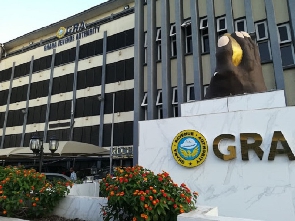 The Ghana Revenue Authority (GRA) is the revenue arm of government
The Ghana Revenue Authority (GRA) is the revenue arm of government
The collaboration between the downstream petroleum unit of the Ghana Revenue Authority (GRA) Customs Division and Strategic Mobilisation Ghana Limited (SML), a revenue and assurance audit firm, is helping the GRA meet and exceed its annual targets.
This came to light when SML Ghana recently held a stakeholder engagement with leadership of the downstream petroleum unit at the Ghana Revenue Authority (GRA) Customs Division in Tema, to discuss new initiatives and solicit opinions on how both sides can improve the successes chalked up and further improve the country’s revenues. This meeting forms part of regular stakeholder engagements.
The GRA mobilised GH¢75.5billion domestic revenue last year, which is GH¢3.60billion more than it was tasked to collect. The collection was a five percent increase over last year’s target of GH¢71.94billion. The feat also meant the domestic revenue mobilised the GRA was 31.5 percent more than that collected in 2021. The Customs Division, which includes the petroleum downstream sector, collected GH¢22.26billion as against a target of GH¢20.20 billion – exceeding the target by GH¢2.06billion.
The stakeholder engagement brought together the various Customs heads in charge of downstream petroleum depots across the country’s 16 regions. SML Ghana took the Customs officials through latest technologies – such as for scanning way-bills and purchase orders and reconciling them with meter volumes at the depots in real-time and introduction of level-sensors to monitor, manage and measure the petroleum stocks.
Christian Tetteh Sottie, Managing Director for SML Ghana, stated that the engagement is aimed at taking the officials through a detailed methodology of how SML Ghana is leveraging technology to improve the sector, and remove any misconceptions while establishing the foundation of both sides as partners.
Leadership of petroleum downstream at GRA Customs Division with executives of SML Ghana
“We have had this collaboration with the GRA Customs Division since 2020, which comes with regular stakeholder engagements; and the team from Customs is really pleased with the work we are doing. The next step is installing level-sensors at all depot sites, which is currently ongoing. This will prevent Customs officials from having to climb the tanks to manually check the level of stock in them on a daily basis,” he revealed.
Meshach Kwame Danso, Acting Head of Petroleum Unit-Customs Division at Ghana Revenue Authority, said the deep collaboration between both parties is a step in the right direction as it seeks to improve the efficiency as well as accountability to government.
“We need to know the right figures to help work go smoothly. Working closely with SML Ghana has given us room to monitor the petroleum figures so we can report to government accurately. Thanks to their technology, we are now able to account for every litre of petroleum product. This collaboration is really good for government’s revenue position,” he said.
He called for more training sessions for the downstream petroleum unit’s leadership and team, so they can keep up with new trends and information. “They are bringing new ideas on revenue assurance, so we are looking forward to more encounters,” he added.
Sampson Anim, Assistant Commissioner-Petroleum Downstream at GRA Customs Division, lauded SML Ghana for its transformative technology to maintain transparency while enhancing the sector and increasing revenues.
“The system is perfect. What we previously had was a very manual system of auditing, but this is a digital system that captures all our lifting from the depots through delivery to the filling stations and whatever destinations the product is supposed to be; so we are able to monitor in real-time how much is being loaded at any depot, and it grants us the assurance that, indeed, whatever we have captured for revenue purposes is accurate.
“Everybody is moving from manual to electronic, and this places us in the midst of technology. And now that we have this electronic system, we are more confident with the job that we do as we are confident that the volumes we churn out are correct and accurate. So, it gives us confidence that whatever we have done is correct; and the revenues to be expected are also accurate,” he said.
Since the technology’s introduction, the average volume per month recorded by SML meters for the product is 400 million litres – which has resulted in an extra revenue of GH¢billion for government between June 2020 and June 2022.
The digital measurement project to monitor revenue from downstream petroleum products from depots across the country is a partnership between the Customs Division of the GRA and SML Ghana, a Ghanaian audit and assurance services company, aimed at digitising the measurement and reporting of petroleum product supplies from over 20 depots across the country.
Known as the Electronic Metering Management System (EMMS), the system digitises the entire process chain by providing an end to end audit and assurance to GRA in the downstream petroleum sector.
Watch the latest edition of BizTech and Biz Headlines below:
Watch the latest edition of Business Moments below: